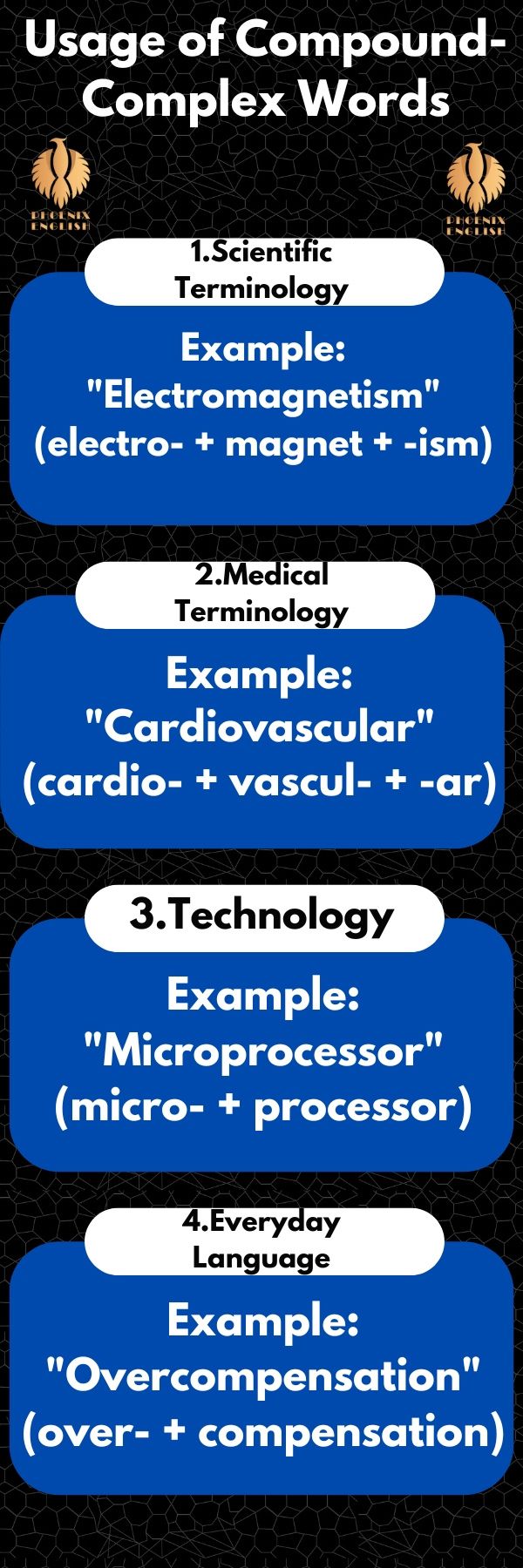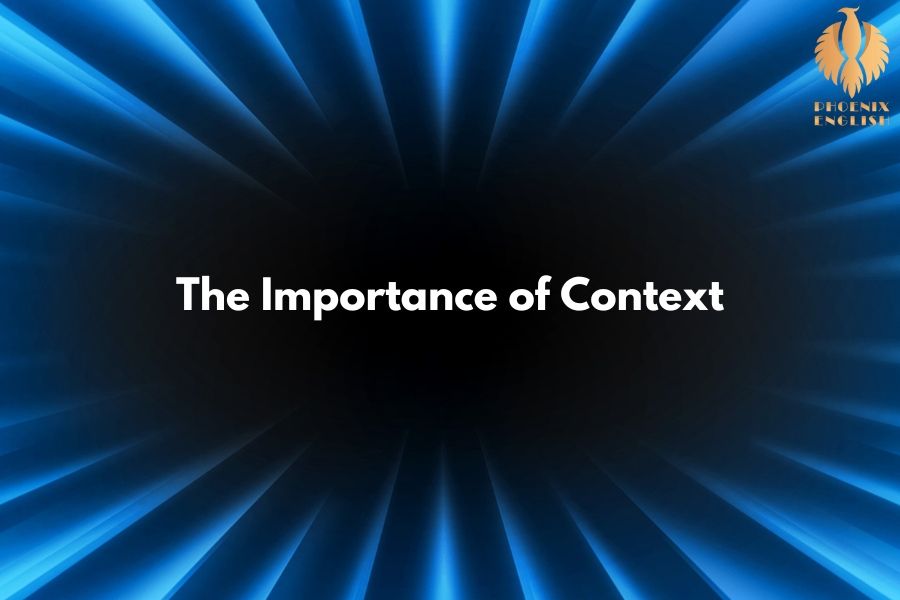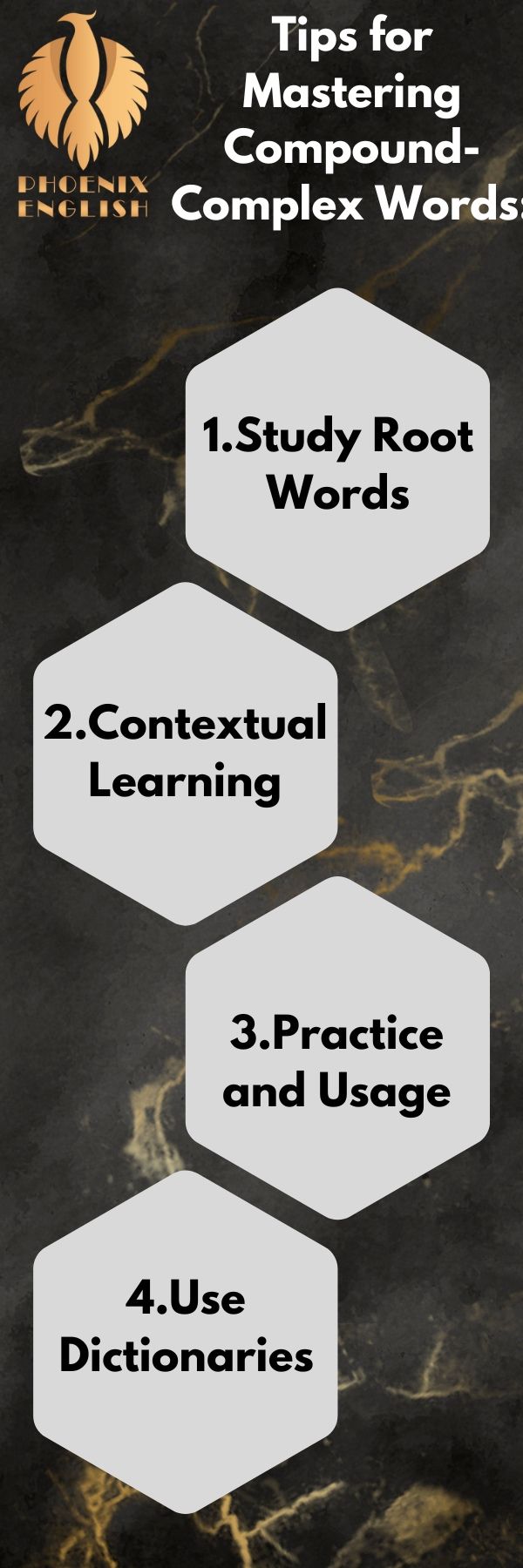First of all, I have to say that compound complex sentences merge the principles of both compound and complex words.
In the rich fabric of the English language, compound-complex words are special constructs that incorporate the qualities of both compound and complex words. These hybrid words, with their intricate relationships and wide range of meanings, emphasize the creativity and adaptability that are innate to language.
The purpose of this article is to examine the application and usage of compound-complex terms by tracing their origins, functions, and significance in modern discourse.
You might also enjoy: Top 100 Commonly Used Verbs That Start With N [2024]
Understanding Compound Words

To fully grasp the concept of compound-complex words, it is essential first to understand compound words. Compound words are formed by combining two or more root words to create a new word with a distinct meaning. They can be classified into three main types:
1. Closed Compound Words:
These are written as a single word, such as “notebook” or “sunflower.”
2. Hyphenated Compound Words:
These are connected by a hyphen, such as “mother-in-law” or “well-being.”
3. Open Compound Words:
These are written as separate words but function together as a single entity, such as “ice cream” or “high school.”
Understanding Complex Words
On the other hand, prefixes and suffixes are added to root words to change their meaning and create complex terms.
To illustrate, the word “unhappiness” is made up of the root word “happy,” the prefix “un-,” and the suffix “-ness,” which together indicate that the object is not happy.
Defining Compound-Complex Words
Compound-complex words merge the principles of both compound and complex words. They typically involve a combination of two or more root words (as seen in compounds), along with prefixes and/or suffixes (as seen in complex words).
This synthesis results in words that carry multifaceted meanings and serve specific linguistic functions.
Usage of Compound Complex Sentence

Compound-complex terms are common in many linguistic fields, such as ordinary communication, science, technology, and literature.
Their use demonstrates the flexibility and accuracy of language, enabling authors and speakers to clearly and concisely communicate complicated ideas. Here are some crucial contexts in which compound-complex terms are frequently employed:
1.Scientific Terminology:
- Example: “Electromagnetism” (electro- + magnet + -ism)
- “Electromagnetism” combines the root words “electro” (related to electricity) and “magnet,” with the suffix “-ism” denoting a system or theory. This word encapsulates the relationship between electricity and magnetism in a scientific context.
2. Medical Terminology:
-
- Example: “Cardiovascular” (cardio- + vascul- + -ar)
- “Cardiovascular” merges “cardio” (about the heart) and “vascular” (related to blood vessels), with the suffix “-ar” indicating about. It describes the system comprising the heart and blood vessels.
- Example: “Cardiovascular” (cardio- + vascul- + -ar)
3. Technology:
-
- Example: “Microprocessor” (micro- + processor)
- “Microprocessor” combines “micro” (indicating smallness) and “processor” (a device that processes data), referring to a compact and powerful processing unit in computers.
- Example: “Microprocessor” (micro- + processor)
4. Everyday Language:
-
- Example: “Overcompensation” (over- + compensation)
- “Overcompensation” blends “over” (indicating excess) and “compensation” (something given to make up for a deficiency), describing the act of excessively compensating for a perceived inadequacy.
- Example: “Overcompensation” (over- + compensation)
Examples and Analysis of Compound-Complex Words
To better understand compound-complex words, let’s delve into a range of examples across different contexts and analyze their structure and meaning.
Example 1: “Antidisestablishmentarianism”
- Structure: anti- + dis- + establish + -ment + -arian + -ism
- Analysis:
- “Anti-” (against)
- “Dis-” (reversal or removal)
- “Establish” (to set up)
- “-ment” (the result of an action)
- “-arian” (a person who advocates or practices something)
- “-ism” (a doctrine or belief)
- Meaning: a 19th-century British political stance that opposed the Church of England’s disestablishment.
Example 2: “Electroencephalography”
- Structure: electro- + encephalo- + -graphy
- Analysis:
- “Electro-” (relating to electricity)
- “Encephalo-” (about the brain)
- “-graphy” (the process of recording or writing)
- Meaning: A medical technique for recording the electrical activity of the brain.
Example 3: “Photosynthesis”
- Structure: photo- + synthesis
- Analysis:
- “Photo-” (relating to light)
- “Synthesis” (the process of combining elements to form a whole)
- Meaning: The method by which certain organisms, such as green plants, employ sunlight to create nutrition from carbon dioxide and water.
Example 4: “Hyperresponsiveness”
- Structure: hyper- + responsive + -ness
- Analysis:
- “Hyper-” (excessive or above normal)
- “Responsive” (reacting quickly or positively)
- “-ness” (state or quality)
- Meaning: The state of being excessively responsive or reactive.
Compound Complex Sentences in Literature

Literature, particularly genres such as science fiction and fantasy, often employs compound-complex words to create immersive and intricate worlds. Authors use these words to convey specific concepts, settings, or technologies that are integral to their narratives.
Example: “Time-traveling”
- Structure: time + travel + -ing
- Analysis:
- “Time” (a continuum in which events occur)
- “Travel” (to move or journey)
- “-ing” (denotes an action or process)
- Meaning: The act of moving through different points in time.
Compound-Complex Words in Business and Marketing
In business and marketing, compound-complex words are used to create brand names, product descriptions, and marketing jargon that resonate with consumers and convey specific attributes.
Example: “Eco-friendly”
- Structure: eco- + friendly
- Analysis:
- “Eco-” (related to the environment)
- “Friendly” (supportive or beneficial)
- Meaning: Products or practices that are not harmful to the environment.
The Role of Prefixes and Suffixes

Compound-complex words are largely formed by prefixes and suffixes. To give the fundamental words new nuances and meanings, they alter them. The following list of frequent prefixes and suffixes for compound-complex words:
Common Prefixes:
- Anti-: Against or opposite
- Example: “Antiviral” (against viruses)
- Bio-: Related to life or living organisms
- Example: “Biodiversity” (the variety of life in a particular habitat)
- Hyper-: Above, beyond, or excessive
- Example: “Hyperactivity” (excessive activity)
- Micro-: Small or minute
- Example: “Microscope” (an instrument for viewing small objects)
- Tele-: At a distance
- Example: “Telecommunication” (communication over a distance)
Common Suffixes:
- -able: Capable of being
- Example: “Manageable” (capable of being managed)
- -ology: The study of
- Example: “Biology” (the study of life)
- -phobia: Fear of
- Example: “Arachnophobia” (fear of spiders)
- -scope: Instrument for viewing
- Example: “Telescope” (an instrument for viewing distant objects)
- -tion: The action or result of
- Example: “Formation” (the action of forming something)
You might also enjoy: Top 100 Commonly Used Verbs That Start With I [2024]
Evolution and Adaptation of Compound-Complex Words
The vocabulary of the English language is always changing, and complex compound words change to reflect new situations and developments in technology. For example, new compound-complex words that characterize contemporary occurrences have been created as a result of the development of the internet and digital technology.
Example: “Cybersecurity”
- Structure: cyber- + security
- Analysis:
- “Cyber-” (relating to computers or information technology)
- “Security” (the condition of not being threatened or in danger)
- Meaning: Measures taken to protect computer systems and networks from cyber-attacks.
The Importance of Context

The meaning and usage of compound-complex words can vary significantly depending on the context in which they are used. Understanding the context is crucial for interpreting these words accurately. For example, the word “feedback” can have different implications in various settings:
Example: “Feedback”
- Structure: feed + back
- Analysis:
- “Feed” (to supply or nourish)
- “Back” (to return)
- Meanings:
- In electronics: A system where the output is returned to the input to control its operation.
- In education: Information provided by a teacher regarding a student’s performance.
- In business: Customer responses or reactions to a product or service.
Compound-Complex Words in Academic Writing
Academic writing often employs compound-complex words to convey precise and specialized meanings. These words are particularly prevalent in disciplines such as medicine, engineering, and social sciences.
Example: “Socioeconomic”
- Structure: socio- + economic
- Analysis:
- “Socio-” (relating to society)
- “Economic” (relating to economics or economy)
- Meaning: About the interaction of social and economic factors.
Challenges in Understanding and Using Compound-Complex Words
Compound-complex words improve communication by offering precise and complex meanings, but they can also be difficult for non-native speakers and language learners to understand. Due to the intricacy of these words, a thorough comprehension of their affixes and root components is necessary.
Tips for Mastering Compound-Complex Words:

1.Study Root Words:
Familiarize yourself with common root words, prefixes, and suffixes.
2.Contextual Learning:
Pay attention to the context in which compound-complex words are used.
3.Practice and Usage:
Regularly use compound-complex words in writing and speaking to reinforce understanding.
4.Use Dictionaries:
Consult dictionaries and online resources to clarify meanings and usages.
Comparative Analysis of Compound-Complex Words Across Languages
The concept of compound-complex words is not unique to English; many other languages also utilize similar structures. Comparative analysis of these words across different languages can provide insights into universal linguistic principles and the unique ways languages evolve to meet communicative needs.
German:
- Example: “Arzneimittelhersteller”
- Structure: Arznei + Mittel + Hersteller
- Analysis:
- “Arznei” (medicine)
- “Mittel” (means or agent)
- “Hersteller” (manufacturer)
- Meaning: A manufacturer of pharmaceutical products.
Japanese:
- Example: “電気通信” (Denki tsūshin)
- Structure: 電気 (denki) + 通信 (tsūshin)
- Analysis:
- “電気” (denki) (electricity)
- “通信” (tsūshin) (communication)
- Meaning: Telecommunications.
Chinese:
- Example: “科学技术” (kē xué jì shù)
- Structure: 科学 (kē xué) + 技术 (jì shù)
- Analysis:
- “科学” (kē xué) (science)
- “技术” (jì shù) (technology)
- Meaning: Science and technology.
You might also enjoy: Top 100 Commonly Used Verbs That Start With D [2024]
The Role of Compound-Complex Words in Language Evolution

Compound-complex terms have significantly influenced the evolution of language. The language changes to reflect new ideas and technological advancements by coining new terms to describe them. Lexical innovation is a process that is necessary to maintain the language’s relevance and ability to convey concepts that are current.
Example: “Nanotechnology”
- Structure: nano- + technology
- Analysis:
- “Nano-” (denoting a factor of one billionth)
- “Technology” (the practical application of scientific understanding)
- Meaning: The manipulation of matter on an atomic or molecular scale.
Educational Implications of Compound-Complex Words
Understanding compound-complex words can have significant implications for language education. Teaching these words can enhance vocabulary development and linguistic comprehension, particularly in specialized fields such as science, medicine, and technology.
Teaching Strategies:
- Root Word Analysis: Encourage students to break down compound-complex words into their root components to understand their meanings.
- Contextual Learning: Use real-world examples and contexts to demonstrate how compound-complex words are used.
- Interactive Activities: Incorporate activities such as word formation games and vocabulary exercises to reinforce learning.
Compound-Complex Words in Poetry and Creative Writing
In poetry and creative writing, compound-complex words can add depth and richness to the language. Poets and writers often use these words to evoke specific images, emotions, and ideas, enhancing the aesthetic and expressive qualities of their work.
Example: “Heartbreaking”
- Structure: heart + break + -ing
- Analysis:
- “Heart” (the organ or center of emotion)
- “Break” (to cause to split apart)
- “-ing” (denoting an action or process)
- Meaning: Causing overwhelming sadness or distress.
The Impact of Social Media and Digital Communication

Compound-complex terms have been influenced in their production and spread by digital communication and social media. Due to the quick flow of information and the requirement for clear communication, new terms that accurately describe modern cultural and technological events are emerging.
Example: “Clickbait”
- Structure: click + bait
- Analysis:
- “Click” (to press a button on a computer mouse)
- “Bait” (something used to lure or attract)
- Meaning: Content designed to attract attention and encourage users to click on links.
The Future of Compound Complex Sentences
As the world continues to change and innovations arise, the evolution of compound-complex words will undoubtedly continue.
These words will play a crucial role in enabling effective communication and capturing the essence of new ideas and technologies.
You might also enjoy: Top 100 Commonly Used Verbs That Start With S [2024]
Conclusion
Compound-complex words demonstrate how versatile and rich the English language is. They enable precise and nuanced communication in a variety of fields and circumstances by combining the qualities of compound and complicated words.
In both daily English and scientific vocabulary, these terms are essential for successfully and concisely communicating complicated concepts.
Gaining an understanding of and proficiency with compound-complex words can improve one’s language abilities and increase awareness of the complicated nature of language.
By exploring their structure, usage, and examples, we gain insights into how compound-complex words function and evolve within the ever-changing landscape of language.
Whether in academic writing, literature, or everyday conversation, these words continue to enrich our communication and reflect the dynamic nature of human expression.
In an ever-changing world, the ability to adapt our language to new contexts and challenges is crucial. “Say less” is a prime example of how language evolves to meet the needs of its speakers, providing efficient and effective tools for communication.
As we continue to navigate the complexities of modern life, the evolution of language will undoubtedly remain a fascinating and vital area of study.

Hi, welcome to my blog! My name is Omid and I am thrilled to have you here! I am an English language teacher with 12 years of experience and hold multiple international certifications (TESOL, IELTS, TOEFL, PTE, CELTA). Additionally, I hold a PhD in Applied Linguistics with a specialization in Teaching English as a Second Language (TESL), which fuels my passion for teaching English and assisting others in mastering the language. To me, nothing is more rewarding than helping individuals enhance their English language abilities through various methods. So, let’s embark on this journey of learning English together.

![an featured image about Compound-Complex Sentence: Usage + Examples [2024]](https://phoenixenglishlang.com/wp-content/uploads/2024/07/Compound-Complex-Sentence-Usage-Examples-2024.jpg)


